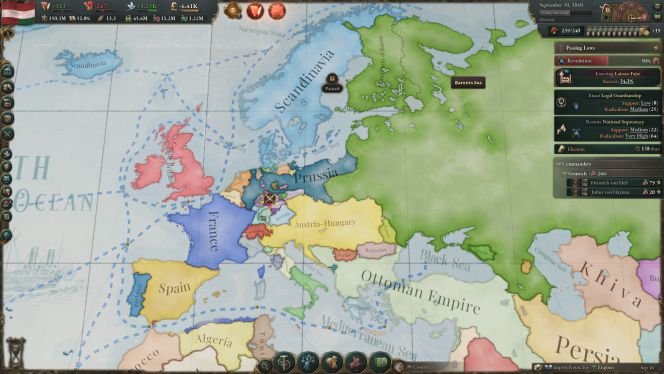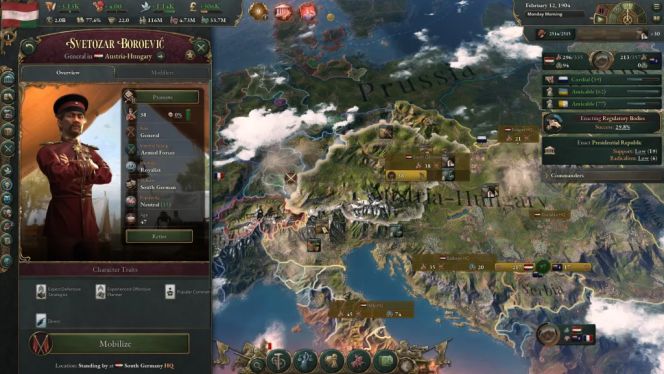REVIEW – Paradox Development Studio’s latest large-scale strategy game takes us into the exciting and changing world of the 19th century, where we can build and control our own society. Victoria 3 is not only a history simulator, but also a social and economic simulator, with a wide range of challenges and opportunities. And it also includes the Austro-Hungarian monarchy and the 1848 revolution, so it’s relevant today.
Victoria 3 covers the period from 1836 to 1936, with over 100 countries to choose from. As well as managing our armies and diplomacy, the game also focuses on our population, which is divided into different groups according to their occupation, standard of living, political views and ethnic or religious affiliation. These groups represent different interests that we must satisfy or reject. The game also features characters who hold important positions in their country or in other countries, with whom we can develop relationships.
Today is 15 March, a national holiday in Hungary, when we remember the heroes of the Hungarian Revolution and War of Independence of 1848. This event also plays an important role in the game, as one of Hungary’s possible goals is to achieve independence from the Austro-Hungarian Monarchy. But how can we control Hungary in the game, and how does 1848 come about? I will write about this in detail in this review.
Governance of Hungary
At the beginning of the game, Hungary is not selected as a separate country, but starts as part of the Austro-Hungarian Monarchy. This means that you cannot decide certain things on your own (e.g. going to war), but are dependent on Austria. However, this does not mean that we are completely powerless.
In Victoria 3, there is an option to “Release a country”, which allows you to leave the Monarchy and become an independent state. However, to do so, we must meet certain conditions: we must have at least 50% loyalty to Austria (which means we do not rebel against it or support independence movements) and at least 50% support among the Hungarian population (which means they are happy with us and do not want to join another country). If we meet these, we can ask Austria to let us go peacefully. If it says no, we can go to war against it, but this involves a great risk. And if it says yes, Hungary becomes an independent state in the game.
The 1848 War of Independence
In Victoria 3, the Hungarian Revolution and War of Independence of 1848 is an important event that has a major impact on the fate of Hungary. In the game, events do not always unfold as they did in reality, but can change depending on certain factors. The 1848 revolution breaks out in the game when Hungary has high nationalism and low loyalty to Austria. Then a character named Lajos Kossuth (although not necessarily the same person) appears and leads the revolution. The aim of the revolution is to achieve independence and establish a constitutional monarchy.
In the game, you can choose to support or reject the revolution. If we support it, we join Kossuth and fight against Austria. If we reject it, we remain loyal to Austria and defeat the revolution. Both choices have their pros and cons. If we support the revolution, we have a better chance of becoming independent and democratic, but we could also get into a war with Austria and other great powers (such as Russia), which could threaten our independence and stability. If we reject the revolution, we can preserve peace and cooperation with Austria, but we could lose popularity and increase discontent in Hungary.
The challenges of the 19th century
In Victoria 3, you can not only learn about Hungary, but also take part in the global events of the 19th century. It includes important historical events such as the Industrial Revolution, the American Civil War, European unification and colonialism. These events can affect the economies, societies and politics of our countries.
Innovation and reform also play an important role in the game. We can explore different technologies or ideas (e.g. building railways, free trade, social reforms) that can improve the situation of our countries. But these innovations do not always have only positive effects. For example, the industrial revolution increases productivity and prosperity, but it also increases poverty, pollution and worker discontent, so it is important to find a balance between different interests.
Colonise me, you imperialist bastard!
In Victoria 3 you can play not only in Europe or America, but also on other continents. The game also includes colonisation, where you can occupy or influence other countries’ territories. Colonisation can bring great benefits in terms of new markets and resources, but also great risks. Colonialism means facing resistance from local populations, competing powers and international public opinion.
There are several ways to colonise in the game. We can be direct colonisers, who directly control the occupied territories, or indirect colonisers, who create local puppet states. You can also be a protectorate or an ally, giving a degree of autonomy to the colonies. Another important factor is the colonisation score, which shows how much new territory we are able to acquire or retain. The colonisation score is influenced by our technological development, our navy and our diplomatic relations, among other things.
Colonialism has not only economic benefits, but also political and social effects. We must also take into account the interests and satisfaction of the populations of the colonies. If we are too oppressive towards them, revolts may break out against us. If we are too permissive towards them, we may lose control over them. Furthermore, Victoria 3 also includes events that could influence colonialism (e.g. the African Conference or anti-colonial movements). So we have to make important choices about how we treat our colonies and how we shape our global influence.
Write your own history!
Victoria 3 tests not only your strategic thinking and historical knowledge, but also your creativity and imagination. There are plenty of opportunities to write your own history and build the country you want. The game is very complex and detailed, which means there are a lot of things to consider and a lot of decisions to make. This can be confusing or difficult at times, especially for beginners, but once you get the hang of it, you can’t help but want to satisfy your megalomaniac imperialist or revolutionary spirit!
Even better, that you can not only deal with your own country, but also interact with other countries. The diplomatic system is very interesting and varied, as you can carry out a wide range of diplomatic actions (e.g. make alliances, start wars or influence other countries). Your rank also plays an important role, showing how influential and respected you are in the world. We can increase our rank through our economic and military strength, our prestige and our innovation.
I also really enjoyed being able to decide for myself what kind of country I wanted to run. I chose Hungary (of course) and tried to achieve independence and development. It was not an easy task, as I had to face many enemies (e.g. Austria or Russia), but I also had many friends (e.g. France or Turkey).
Also fundamental in Victoria 3 was the aforementioned 1848 revolution, during which I could decide whether or not to support Kossuth. Of course I supported him (of course not) and fought for independence. Unfortunately, I did not completely break away from Austria (because Russia intervened), but at least I gained more ‘autonomy’. That story sounds familiar, doesn’t it?
Complex, complex strategy game a la Paradox
Victoria 3 is a very complex and in-depth game, with plenty of opportunities to write your own history. The game focuses not only on warfare and diplomacy, but also on society and economics. The events of the Hungarian Revolution and War of Independence of 1848 also play an important role in the game, and may influence the fate of Hungary. The game’s graphics and music are also very beautiful and atmospheric, and faithfully reflect the world of the 19th century.
Fiery 1848 revolutionaries, cold-hearted imperialist rulers, generals, monarchs, kings and megalomaniac strategists, it’s time to dive into Victoria 3, an exciting and challenging strategy game with plenty of opportunities to shape your own history and experience the world of the 19th century. I recommend it to anyone who loves historical strategy games and wants to take part in the exciting events of the 19th century !
-BadSector-
Pro:
+ Highly detailed and realistic historical simulator
+ We can choose from many different countries and control them in many ways
+ Interesting and varied social and economic mechanics
Contra:
– Very complicated and difficult to learn game
– Sometimes slow or stuttering gameplay
– Some events or decisions are too random or unrealistic
Publisher: Paradox Interactive
Developer: Paradox Development Studio
Style: “Grand Strategy”
Release: October 25, 2022.
Victoria 3
Gameplay - 8.2
Graphics - 7.8
Campaigns - 9.2
Music/Audio - 8.5
Ambience - 8.2
8.4
EXCELLENT
Fiery 1848 revolutionaries, cold-hearted imperialist rulers, generals, monarchs, kings and megalomaniac strategists, it's time to dive into Victoria 3, an exciting and challenging strategy game with plenty of opportunities to shape your own history and experience the world of the 19th century. I recommend it to anyone who loves historical strategy games and wants to take part in the exciting events of the 19th century !





















Leave a Reply